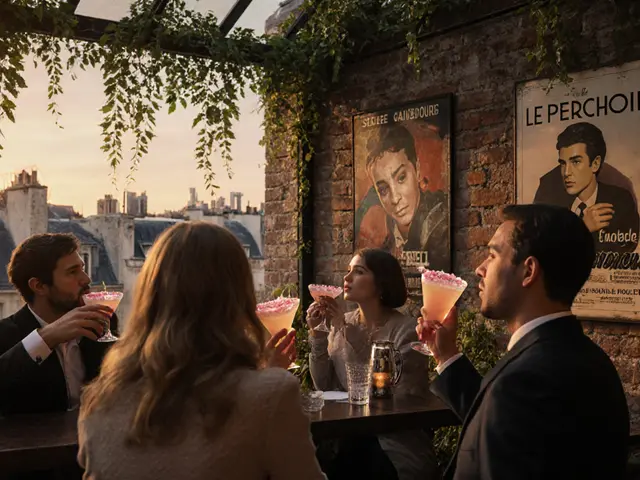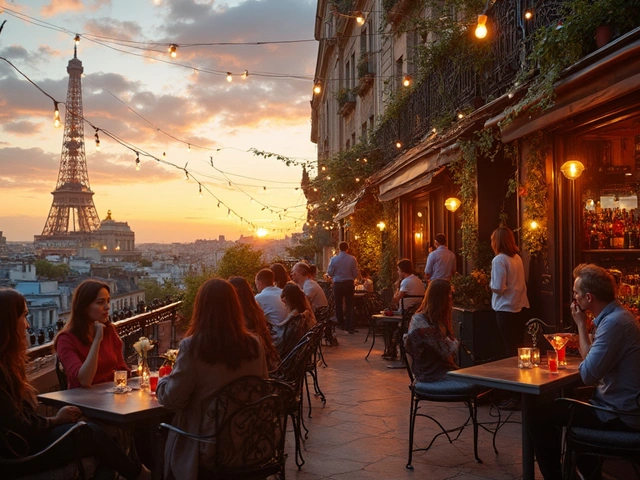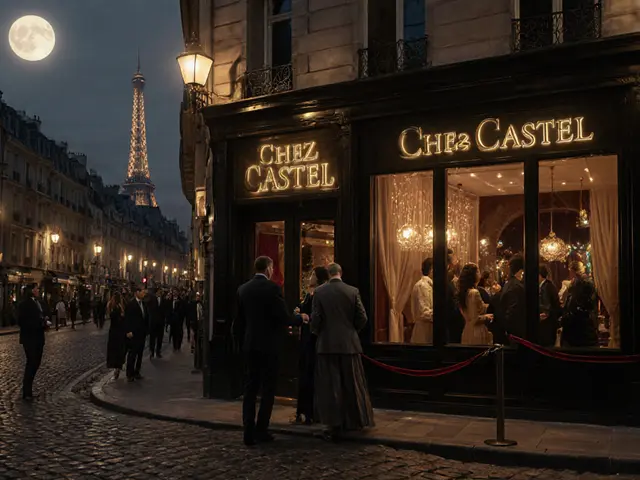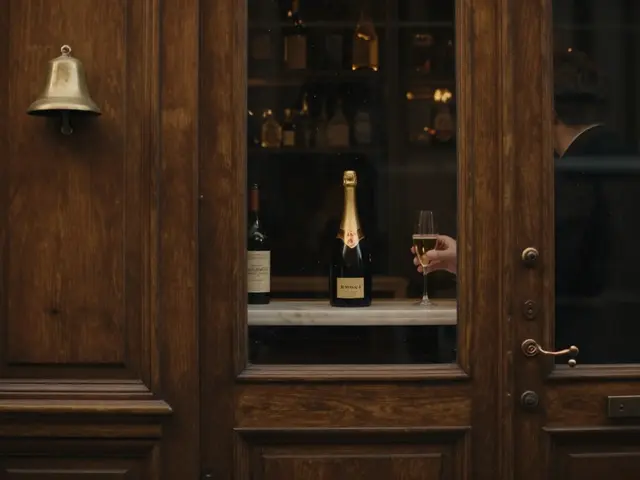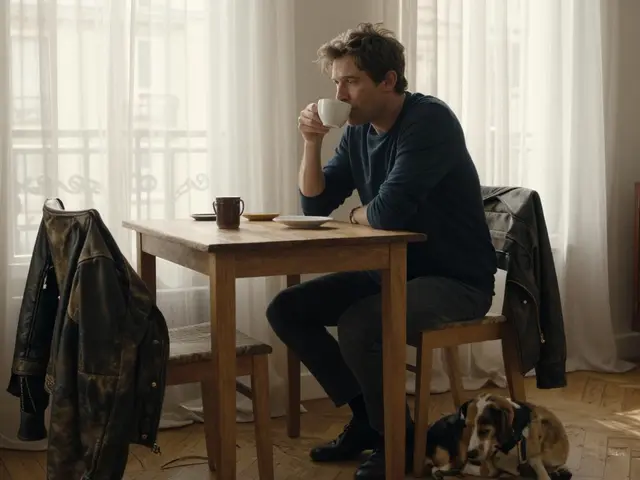It’s hard not to be intrigued by someone who changed the script in one of the world’s most provocative industries. When you think of Paris nightlife, you probably picture swanky cocktail bars, moody jazz clubs, or people-watching from a sidewalk café. But David Perry wasn’t drawn just to the smoky glamour. His story is about carving out space behind the curtain, where Paris’s secret pulse beats even louder. His name might spark wild stories and internet myths, but the way he became a Parisian legend is rooted in real hustle, guts, and some surprising twists. For anyone curious about the real Paris—its untold stories, wild successes, and complex personalities—David Perry’s journey is worth unpacking.
From London Rebellions to Parisian Dreams
If you’ve seen David Perry in interviews, you know he doesn’t shy away from his roots. Born in London in 1970, Perry came up tough—think dodging expectations, night-time odd jobs, and a burning urge to outrun a structured system that never made sense to him. His original dream wasn’t red carpets or camera flashes: as a rebellious teenager, he wanted out. At just 18, with a small stack of French francs in his pocket—this was before the euro!—he hopped a train to Paris, adopting the city as both challenge and escape.
Paris in the late ‘80s was wild and a bit wicked, a patchwork of grit and glamour that Perry found magnetic. The city’s adult scene, unlike London’s buttoned-up approach, felt open, wild, and playful. This is where Perry’s resourcefulness kicked in. He got his start not on magazine covers but bouncing between odd jobs—bartender, stagehand, and, for a painfully short stint, waiting tables at one of the city’s infamous cabarets (he was famously fired for distracting the dancers with jokes). But those random nights gave him more than rent money—they unlocked Paris’s after-hours world, a scene that shaped both his social circle and his ambitions.
Most fascinating? Perry didn’t land his first film until 1993, already in his twenties, which in adult cinema terms is late to the party. But the Parisian scene, always hungry for something different, had room for his rugged authenticity. Friends from the nightlife circuit introduced him to a casting agent, and what started as a “just-for-fun” dare turned into repeated bookings. The European style was more daring—less formulaic than American studios—so Perry’s British edge felt fresh. The French adult film industry at the time was surprisingly collaborative, with crews often staying after set to swap ideas (and the city itself acting as a magical third character).
Perry’s early roles leaned on his natural charisma and quick wit more than chiseled looks. Behind the scenes, he was known for being reliable and adaptable. Not many realize that his fluency in French, picked up hustling on Paris streets, made him an asset in a field that juggled multilingual sets and cross-border projects. By the end of the ‘90s, David Perry wasn’t just showing up; he was in demand—directors would plan shooting schedules around his availability, an unheard-of privilege for a non-French-born performer.
He once said that Paris taught him how to “dance between worlds.” That’s no exaggeration: Perry found himself mingling with photographers, fashion insiders, and indie filmmakers. There’s an old story from a Paris Film Festival afterparty, where Perry—still largely unknown to mainstream media—found himself joking with Catherine Deneuve on one side and exchanging career tips with director Pierre Woodman on the other. It’s these off-the-record moments that made Paris both his playground and creative engine.
The Rise To Fame and the Adult Entertainment Revolution
The French adult industry in the early 2000s was on fire. France had become the second-largest producer of adult films in Europe, right behind Germany, and Paris was at the epicenter. Perry, by that time, was riding the crest of this wave. His most famous films weren’t just popular—they helped set trends. Take the film "Les Tordus" (1998): it wasn’t just another DVD flick; it’s now considered a cult classic for its blend of comedy and raw storytelling. French fans still quote his lines in forums. If you’re looking for data, from 1995 to 2005, Perry appeared in more than 150 films, according to the French Center for Cinema. Let that sink in—150+
Perry’s appeal came from not fitting the traditional male porn star stereotype. He wasn’t about gym-crafted abs and predictably suave lines—instead, he had a sly grin, a streetwise charm, and what one director called “emotional danger.” Fans loved him because he felt real. Insiders will tell you his sets were famous for laughter and improvisation, which was rare in an industry that can feel manufactured. In 2001, he even tried his hand at directing, working with up-and-coming talents and pulling in a more youthful, edgy energy. He collaborated with French icons like Katsuni and Mélanie Coste, and became a mentor behind the scenes. This period, when Perry was both starring and directing, is often called the "Golden Age" of French adult film.
And don’t think he was content to just hang around the same circles. Perry saw a shifting market with the rise of internet streaming. He wasn’t just starring in old-school productions—by 2005, he launched one of Paris’s first online subscription adult sites, before this was standard. He understood that Parisian nightlife wasn’t staying in smoky back rooms; it was moving onto screens everywhere. As the lines blurred between nightlife, fashion, and adult entertainment, Perry doubled down on authenticity. He attended Paris Fashion Week events, hosted panels at adult industry conventions, and consulted for new directors aiming to shake up the old formula.
The numbers tell part of the story. Adult cinema in France employs over 20,000 people, from performers to set designers. According to a 2024 industry report listed in the table below, revenues topped €220 million last year, and digital content is now responsible for over 65% of income. Perry, by pivoting to digital, kept himself relevant when many of his peers faded out. In interviews, his business advice boils down to one thing: "Don’t try to copy America. Make something Parisian. It’ll travel farther."
| Year | French Adult Film Revenues (€ millions) | Digital Share |
|---|---|---|
| 2010 | 150 | 40% |
| 2015 | 175 | 54% |
| 2020 | 210 | 60% |
| 2024 | 220 | 65% |
If you’re thinking about breaking into any part of the Parisian adult scene—or nightlife in general—Perry’s track record shows one thing: get ready to adapt, stay open to new people, and don’t be afraid to shape your story differently. He’s stayed in the game not by being loudest, but by quietly turning every night into an opportunity to connect, learn, or just crack an unexpected joke that’ll make everyone on set crack up. Honestly, Paris loves a good laugh just as much as it loves a good scandal.
Behind the Flashbulbs: Secrets and Real Lessons from Perry’s Paris
Everyone wants to know what it’s really like living as a Parisian adult star. Perry’s Paris wasn’t about endless parties or tabloid moments. The grind is real—long shoots, endless travel, crash courses in everything from French labor laws to camera angles. Perry didn’t just survive; he thrived because he mixed hustle with heart. One tip from industry insiders: he always showed up early to set, which in nightlife terms is almost unheard of (most people are permanently late). That built trust, and trust gets you the best gigs.
He’s also credited with turning Paris into a friendlier, more international hub. The Paris scene had a reputation for being cliquish in the ‘90s—outsiders didn’t get an easy pass. Perry helped soften those boundaries. Stories circulate about him inviting international newcomers out for drinks, giving casual tours of nightlife neighborhoods like Pigalle or Oberkampf, and helping them get used to quirky French set etiquette (like the tradition of a post-shoot apéro, where cast and crew swap stories and decompress together).
If you’re ever in Paris wanting to catch a hint of this world, don’t just look for neon lights or packed basement clubs. Sometimes, it’s in the quieter exchanges—a late-night espresso shared with a burlesque dancer, the nervous energy before cameras roll, or the camaraderie that grows from working in a business many people still don’t fully understand. Perry often says that “Paris makes you honest with yourself, whether you want it or not.” That means being real with flaws as much as with dreams.
- Networking: Perry’s style was all about showing up in unexpected places (art shows, dive bars, book launches) and genuinely talking to people. The result? Opportunities landed in his lap that a scripted career could never plan.
- Learning the language: Mastering French slang gave Perry an insider edge. Locals trust you when you can joke in their language. If you’re moving to Paris, prioritize this—it opens doors beyond just work.
- Staying professional: Even when parties got wild, Perry was known for a "work first, play later" policy. Directors noticed, and it kept his reputation golden, even when others burned out.
- Blending worlds: Perry’s connections with fashion, film, and music meant creative cross-pollination. He championed collaboration—the kind that got photographers on set or musicians soundtracking films. That made his projects feel bigger than the stereotype.
There’s still curiosity around Perry. He’s retired from acting but is active on social media and at industry events. Fans and aspiring artists reach out to him for tips. His DMs aren’t just filled with admirers—they’re often brimming with questions from budding directors or talent hoping to follow his blueprint. His advice: "Be yourself, and let Paris rub off on you, not the other way around." Whether you’re after the nightlife, running your own creative hustle, or just looking for some backbone to try something new, his path is proof that there’s room in Paris for anyone stubborn enough to make it their own.


